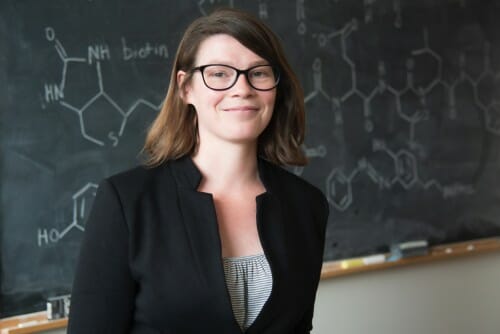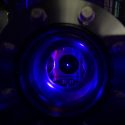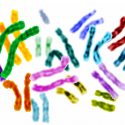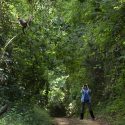UW–Madison biochemist Amy Weeks named Packard Fellow
Amy Weeks, a University of Wisconsin–Madison professor of biochemistry, has been selected as a Packard Fellow for Science and Engineering.
The fellowship is awarded annually to early-career scientists from across the United States and provides $875,000 of funding over five years. Weeks is one of 20 members chosen for the honor by the David and Lucile Packard Foundation for the 2021 class.
A researcher who studies the proteome, a set of proteins encoded in the genes present in a cell at any given time, Weeks finds parallels between her love of long-distance running and her research.
“In both running and, in my research, I’ve learned the value of focusing on process over outcome,” Weeks says. “In running, you have to put in the training and that doesn’t necessarily mean you will hit a specific race time, but the process is worth it. That is also true in science, in that we focus on doing the right experiments with the goal of figuring out what is true.”
And it’s that race of discovering truth — for Weeks, the process of using enzymes for mapping biological signals across space and time in living cells — that has led her to a very big win.
Weeks will use the funds to support the people in her lab and to make sure they have the tools they need to execute their ideas. Weeks employs five graduate students who are working with her to provide an integrated view of cellular signaling to advance biological discovery, with potential therapeutic implications.
Weeks is also looking forward to the annual meeting of this year’s class of Packard Fellows.
“The fellows are so diverse and cover many disciplines,” Weeks says. “It’s not just bio scientists and I’m excited about interacting with people from other disciplines.”
The Packard Fellowships in Science and Engineering are among the nation’s largest nongovernmental fellowships. Since 1988, the program has supported the scientists and engineers whose research over time has led to new discoveries that improve people’s lives and enhance our understanding of the universe.
Weeks is UW–Madison’s 17th Packard Fellowship winner.
“Packard Fellows are at the cutting edge of research into crucial issues and have gone on to receive the highest accolades,” says Brian Fox, associate vice chancellor for research policy and integrity and the chair of the Biochemistry Department. “Amy takes a creative approach to her research and thinks big.”
“When graduate students come into my office and are interested in joining the lab, the main pieces of advice I give them are to be curious and to be willing to learn.”
Amy Weeks
Other Packard Fellows have gone on to win Nobel Prizes in Chemistry and Physics, the Fields Medal, the Alan T. Waterman Award, the Breakthrough Prize, the Kavli Prize, and election to the National Academies of Science, Engineering, and Medicine.
Each year, the foundation invites the presidents of 50 universities to nominate two early-career professors each from their institutions. They consider those in the disciplines of physics, chemistry, mathematics, biology, astronomy, computer science, earth science, ocean science and all branches of engineering.
Packard Fellows are encouraged to think big and look at complex issues with a fresh perspective. For Weeks, this thinking means organizing her research around a grand challenge in biology: assigning functions to the hundreds of thousands of modifications that occur in human cells to the proteins the cells produce from mRNA. Her research group draws from diverse disciplines, including protein engineering, chemical biology, cell biology and proteomics, using a host of different tools and technologies.
“If we can do this, I think it will be really powerful in different areas of both fundamental biology and also medicine,” Weeks says. “When graduate students come into my office and are interested in joining the lab, the main pieces of advice I give them are to be curious and to be willing to learn. You don’t have to come in knowing everything, but you have to be willing to try to figure it out.”
In a recent undergraduate class she taught, Weeks also shared a lesson that she borrowed from (now emeritus) chemistry Professor JoAnne Stubbe of MIT. Weeks attended MIT for her undergraduate studies in chemistry and Stubbe has had a strong influence on her. Stubbe said, “Enzymes are not magic. They’re just chemistry.”
After MIT, Weeks went on to earn a PhD in chemistry at the University of California, Berkeley. She completed her postdoctoral training at the University of California, San Francisco.
Weeks came to UW–Madison in 2019 and set up her lab just six months before the COVID-19 pandemic forced much of campus to go online.
“I feel fortunate that I was able to get my lab up and running and then when the pandemic hit, it was a matter of trying to figure out how to shut everything down,” she recalls. “I can’t say that there has been any silver lining to the pandemic, given the human toll, but I am incredibly proud of the resilience of my group as they worked under difficult circumstances, and their kindness, compassion, and care for one another and for their community.”
The shift to remote work did, however, offer her lab a little bit of an opportunity.
“The lab was so new that we didn’t have data to analyze or a paper to write and we decided to pursue a bioinformatics project as a group, which is something we don’t normally do, and we all learned a lot from that,” she explains. “Now we have some wet lab experiments running that came out of that. We have some interesting things using our bioinformatic approaches and we are following up on those.”
But she acknowledges that the pandemic also was a big setback, and it prevented her lab from accumulating the preliminary data that it otherwise might have.
“The Packard Fellowship award is exciting and it is a real relief right now to have some extramural funding for my research that will support my lab going forward,” she says.
Tags: biosciences, faculty awards




